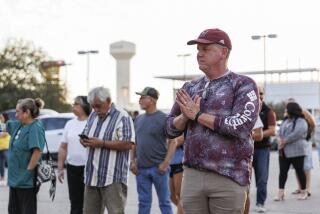Mayor Barry Returns, Quashing Speculation About Resignation
WASHINGTON — Ending speculation that he might resign, Washington Mayor Marion Barry reclaimed his office Monday after an unscheduled 17-day leave to seek physical and spiritual renewal.
Barry, who served a six-month prison sentence after FBI agents videotaped him smoking crack cocaine in 1990, suddenly turned over the running of the nation’s capital to his chief of staff and chief financial officer on April 27. Rumors were rampant that the mayor had relapsed into alcohol and drug abuse.
At the time, Rock Newman, a close friend of the four-term mayor, heightened public concern by saying Barry was fighting “a battle for personal survival.” There were reports Barry had been seen back on Washington’s late-night circuit, where he had became legendary in the 1980s as a mayor living on the fast track.
But on Monday, Barry, 60, emerged from the seclusion of two retreats to reassure his cabinet and the media that he was healthy and capable of governing, and had regained “an active and reciprocal relationship with my God.”
“I come back more rested, with more energy, with clearer vision, and more determined than ever before to transform our D.C. government into America’s first city . . . and more determined than ever to lead our city out of financial distress,” Barry said.
Although many in this financially crippled city applauded his candor in admitting he had problems, Barry’s credibility and political competence have increasingly come into question in the last few weeks.
Nevertheless, “the truth is, if he had resigned, it would have thrown the city into crisis and things would have gotten even worse than they are now,” said Councilman Frank Smith Jr. “I’m glad he’s back. He looks healthy. Our fingers are crossed and we’re hoping for the best.”
Barry, who has been attending meetings of Narcotics Anonymous and Alcoholics Anonymous, denied he had started using drugs and alcohol again and said his problems stemmed from exhaustion, caused by returning to work too soon after surgery for prostate cancer, first diagnosed last November. He said that during his leave he had made a “fearless moral inventory of myself”--one of the steps in the 12-step program used by recovering alcoholics.
Both critics and supporters agreed that the irrepressible, charismatic Barry was at his best in justifying his sudden leave. He made frequent references to God, presented himself as the victim of overwork and dedication and let it be known that his return to office represented another political comeback of sorts in his roller-coaster career.
After serving six months in prison on the misdemeanor drug charge, Barry stunned Washington by winning election to the City Council’s Ward 8--the city’s poorest ward--and then in November 1994 recapturing the mayor’s office. In a city that is three-quarters black, his biggest appeal was to the disenfranchised poor who admired his audacity and his willingness to stand up to the white establishment.
But many residents said Barry seemed to have run out of ideas and fire in his fourth term. With the city sinking deeper into a morass of financial ruin, governmental mismanagement and undelivered city services, the mayor became less visible and apparently less able to control events the way he once did.
Barry’s authority was further eroded a year ago when Congress transferred much of his power to a financial control board in the wake of a study saying Washington faced a $722-million budget shortfall. Additionally, the courts have seized entire city departments, including foster care and public housing, along with the receiving home for juvenile delinquents.
As the mayor for 13 of the last 17 years, Barry has taken an increasing share of the blame and has seen his public support erode.
More to Read
Get the L.A. Times Politics newsletter
Deeply reported insights into legislation, politics and policy from Sacramento, Washington and beyond. In your inbox three times per week.
You may occasionally receive promotional content from the Los Angeles Times.










